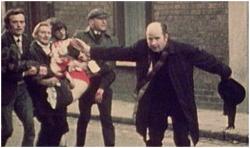Bloody Sunday soldiers escape justice
By Harry Hutchinson, member of the Labour Party Northern Ireland
The decision to uphold the review by the Public Prosecution Service (PPS) of fifteen former soldiers implicated in the murder of 13 civilians on Bloody Sunday, will likely exonerate these soldiers from justice. In particular it will gloss over the role of Michael Jackson, Commander of the 1st Battalion of the Parachute Regiment, which opened fire on the civilians.
What came to be known as Bloody Sunday, or the Bogside Massacre, took place on 30 January 1972 in the Bogside area of Derry, Northern Ireland. On that day British soldiers shot twenty-six unarmed civilians, following a peaceful protest march against internment without trial, which had been introduced earlier. Fourteen people died: thirteen killed outright, with another man dying four months later as a result of his injuries.
Shot whilst fleeing
Many of the victims were shot while fleeing from the soldiers and some were even shot while trying to help the wounded. Other protesters were injured by shrapnel, rubber bullets, or batons, and two were run down by army vehicles.
The PPS review, by its Senior Assistant Director Marianne O’Kane, had been sought by the families of the victims. But if found “available evidence insufficient to provide reasonable prospect of convictions.” O’Kane concluded that “the Test for Prosecution is not met on evidential grounds to prosecute any of the 15 soldiers in connection with the specific deaths or injuries sustained on 30th January 1972”.
It is clear that evidence provided by the lawyers of the families was ignored. As was previous evidence, from 2016, on twenty suspects in relation to events on that day (eighteen soldiers and two members of the Official IRA), forwarded by the Police Service of Northern Ireland.
Civil Rights demanded equal rights
The 10,000-strong march on that fatal day in January 1972 had been organised by the Northern Ireland Civil Rights Association. As well as opposing the introduction of detention without trial, the march was demanding equal rights for all citizens in the north. At that time, there was no simple voting system as existed in the rest of the UK, where every adult had the right to a vote. In Northern Ireland, the system was rigged so that Catholics were disenfranchised, to the benefit of Protestants, with the result that it created a divide-and-rule keeping the two communities apart.
A few months before Bloody Sunday, in August 1971, the same Parachute Regiment responsible for the killings in Derry, had shot dead eleven civilians in Ballymurphy, in West Belfast. When internment was introduced, hundreds were detained and mistreated, in effect tortured.
Aimed to crush a mass uprising
The purpose of both these massacres by the British Army was to crush a potential mass uprising among Catholic workers, before it had any opportunity of spreading to Protestant workers, whose economic ‘advantages’ were only marginal. It was a brutal response to what had been simply a demand for democratic rights for all the citizens of Northern Ireland. At the time of the massacre, Bloody Sunday was regarded as equivalent to the Sharpeville massacre in South Africa, in 1960.
Anger at the PPS decision has been expressed by the families of the Bloody Sunday victims, although there is little surprise, because of confidence in British justice is slight. But the victims’ families are refusing to give up the fight and are now considering a further judicial review.
All those involved in the Bloody Sunday massacre must face trial, along with Soldier ‘F’, who is implicated in the murder of two of the civilians, and a proper application of justice must include those senior officers on duty that day and responsible for the actions of their troops.
A new Bill to legalise torture
The decision of the PPS has come days after the Westminster government has pushed through the second reading of its Overseas Operations Bill, which effectively creates an amnesty for British soldiers accused of mistreatment or tortures overseas.
In evidence given in a session of the House of Commons Human Rights Committee, it became clear that “torture” had originally been exempted from the Bill, along with “sexual violence”, but ministers subsequently removed these exemptions.
The Bill will end the right of anyone to bring a legal case against serving or former British soldiers for offences alleged to have been committed more than five years before. It has even been criticised by senior military officers, as well as human rights groups, who have said it act as a “licence to torture”.
Labour’s lack of opposition is a disgrace
Disgracefully, the official policy of the Parliamentary Labour Party was to abstain on voting on this Bill, on the spurious grounds of parliamentary procedure: Labour says it will try to “improve” the bill at committee stage. It was therefore only fifteen Labour rebels, including Jeremy Corbyn and John McDonnell, who voted against. Even the Campaign Group of so-called ‘left’ MPs couldn’t muster their thirty-odd members to vote against. If this is an example of Labour’s “opposition” to the Tories, it will fall flat, like the Tory-lite opposition of Ed Miliband.
Labour should a champion of those who have suffered injustices, including the families bereaved by the Bloody Sunday massacre. Labour should be demanding that there are proper legal restraints, safeguards and accountability on all the operations of British forces overseas, including operations and incidents unearthed in the past.
September 30, 2020



